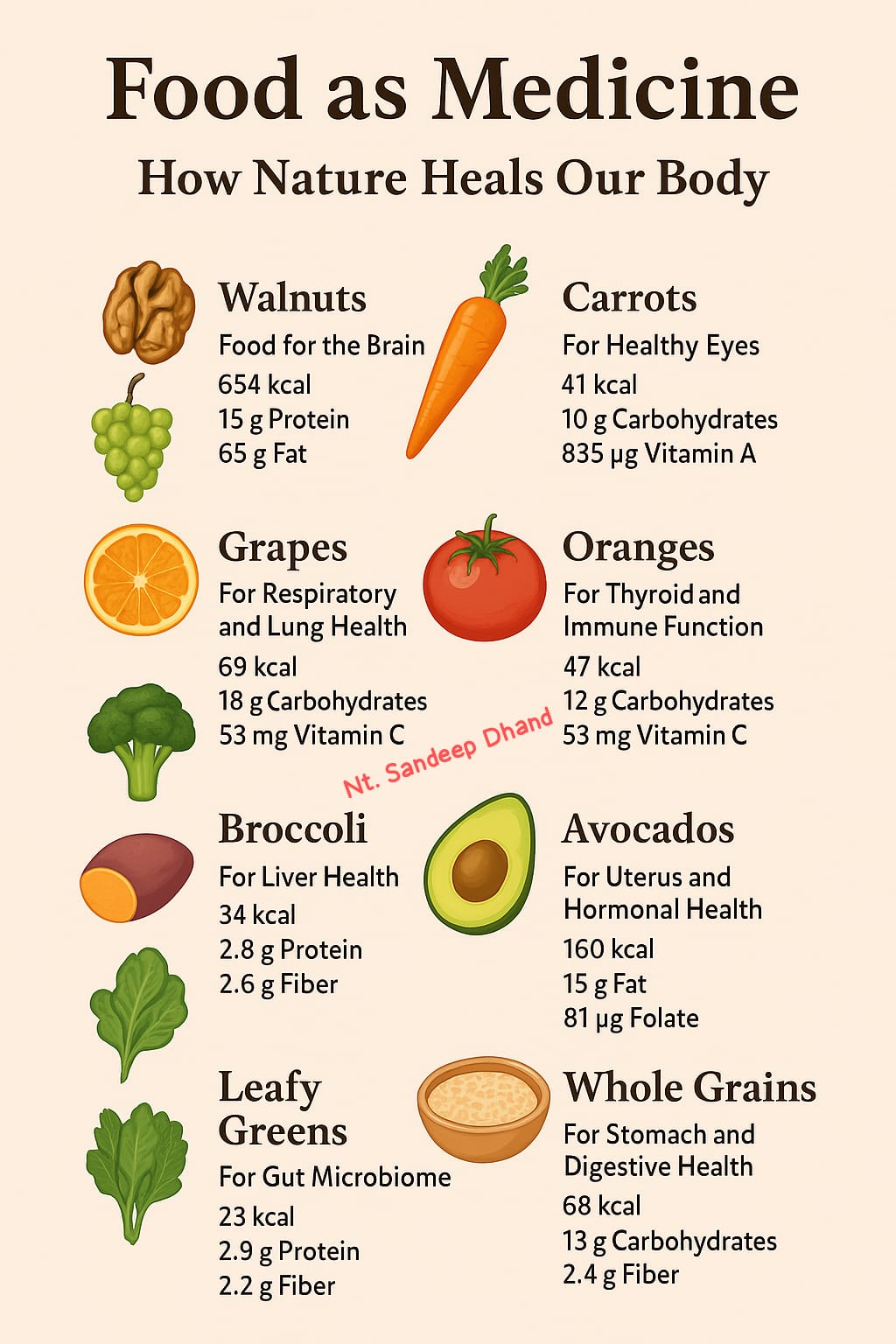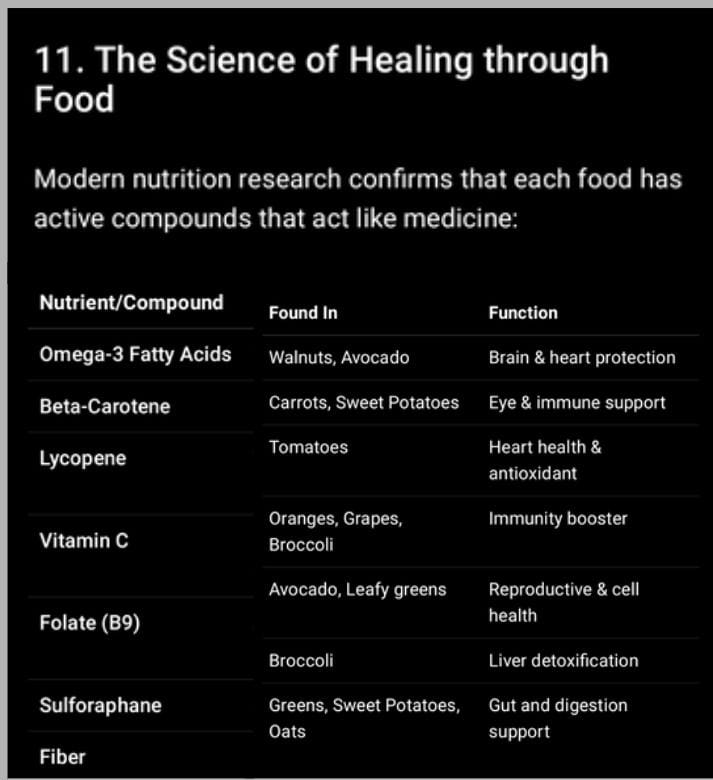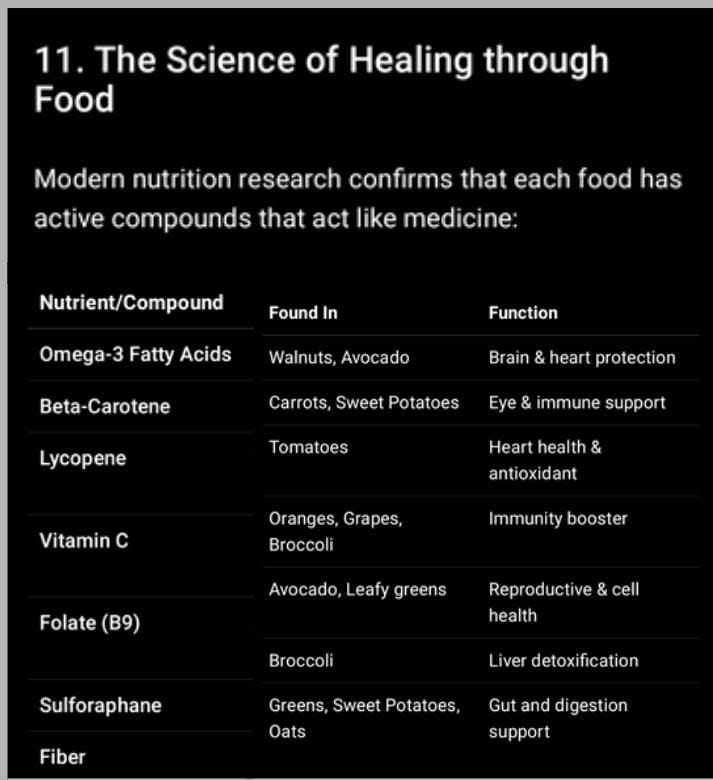Sandeep Dhand
Nutritionist And Health Educator
Introduction
Food is more than something that fills our stomach — it is nature’s own medicine. Every fruit, vegetable, nut, and seed contains special nutrients that help specific parts of our body stay strong and healthy. Modern science now proves what our ancestors always believed: eating the right food can prevent illness, repair damage, and even improve mood and energy.
The idea of “Food as Medicine” means that when we eat natural foods, we are nourishing our body and healing it at the same time. In this article, we’ll explore how different foods — walnuts, carrots, grapes, oranges, tomatoes, broccoli, sweet potatoes, avocados, and leafy greens — help particular organs in our body and provide vital nutrients.

- Walnuts – Food for the Brain
Walnuts look like the human brain, and they actually support brain health. They are full of omega-3 fatty acids, which are essential for memory, focus, and mental sharpness.
Nutritional Value (per 100 g):
Calories: 654 kcal
Protein: 15 g
Fat: 65 g (mostly healthy unsaturated fats)
Omega-3 fatty acids: 2.5 g
Vitamin E: 0.7 mg
Magnesium: 158 mg
Health Benefits:
Boosts memory and concentration
Improves mood and reduces anxiety
Protects brain cells from aging
Reduces risk of Alzheimer’s disease
How to Eat:
Eat 4–6 soaked walnuts daily in the morning or add chopped walnuts to salads, oatmeal, or yogurt.
- Carrots – For Healthy Eyes
Carrots are one of the best foods for vision because they are rich in beta-carotene, which the body converts into vitamin A — a nutrient necessary for clear eyesight and eye protection.
Nutritional Value (per 100 g):
Calories: 41 kcal
Carbohydrates: 10 g
Fiber: 2.8 g
Vitamin A: 835 µg (93% of daily need)
Vitamin C: 6 mg
Potassium: 320 mg
Health Benefits:
Prevents night blindness
Reduces risk of cataracts
Protects eyes from UV light damage
Supports skin and immune health
How to Eat:
Drink fresh carrot juice or eat raw carrots as a snack. They also taste great in soups and salads.
- Grapes – For Respiratory and Lung Health
Grapes, especially red and black ones, are packed with resveratrol and flavonoids, powerful antioxidants that protect the lungs and improve breathing capacity.
Nutritional Value (per 100 g):
Calories: 69 kcal
Carbohydrates: 18 g
Vitamin C: 10 mg
Vitamin K: 22 µg
Potassium: 191 mg
Antioxidants: Resveratrol & Quercetin
Health Benefits:
Supports lung health and reduces inflammation
Helps control asthma and allergies
Protects against infections
Improves heart circulation
How to Eat:
Enjoy a handful of grapes as a snack or add them to smoothies and fruit salads.
- Oranges – For Thyroid and Immune Function
Oranges are rich in vitamin C, which supports the thyroid gland, boosts metabolism, and strengthens the immune system.
Nutritional Value (per 100 g):
Calories: 47 kcal
Carbohydrates: 12 g
Vitamin C: 53 mg (59% of daily value)
Folate (B9): 30 µg
Potassium: 181 mg
Fiber: 2.4 g
Health Benefits:
Supports thyroid hormone production
Improves metabolism and energy levels
Reduces fatigue and weakness
Protects against infections and colds
How to Eat:
Eat one orange daily or drink freshly squeezed juice without added sugar.
- Tomatoes – For Heart Health
Tomatoes contain lycopene, an antioxidant that protects the heart by lowering bad cholesterol (LDL) and improving good cholesterol (HDL).
Nutritional Value (per 100 g):
Calories: 18 kcal
Water: 95%
Vitamin C: 14 mg
Lycopene: 3 mg
Potassium: 237 mg
Vitamin K: 7.9 µg
Health Benefits:
Strengthens heart muscles
Controls blood pressure
Prevents atherosclerosis (artery blockage)
Reduces risk of stroke and heart attack
How to Eat:
Use fresh or cooked tomatoes in soups, curries, or salads. Cooked tomatoes release more lycopene, so tomato soup or puree is especially beneficial.
- Broccoli – For Liver Health
Broccoli is a green vegetable rich in sulforaphane and glucosinolates, which help the liver detoxify harmful substances.
Nutritional Value (per 100 g):
Calories: 34 kcal
Protein: 2.8 g
Fiber: 2.6 g
Vitamin C: 89 mg
Vitamin K: 101 µg
Folate: 63 µg
Calcium: 47 mg
Health Benefits:
Cleanses liver toxins naturally
Prevents fatty liver disease
Improves digestion
Supports metabolism and immunity
How to Eat:
Eat steamed broccoli or lightly stir-fry it. Avoid overcooking to retain nutrients.
- Sweet Potatoes – For Blood Sugar Balance
Sweet potatoes are rich in fiber, antioxidants, and complex carbohydrates that help regulate blood sugar and support gut health.
Nutritional Value (per 100 g):
Calories: 86 kcal
Carbohydrates: 20 g
Fiber: 3 g
Vitamin A: 14187 IU (283% daily value)
Vitamin C: 3 mg
Potassium: 337 mg
Health Benefits:
Stabilizes blood sugar levels
Improves insulin sensitivity
Boosts digestion and immunity
Provides slow, steady energy
How to Eat:
Boil or bake sweet potatoes for snacks. Avoid deep frying to preserve nutrients.
- Avocados – For Uterus and Hormonal Health
Avocados are one of the most nutrient-dense fruits, loaded with healthy monounsaturated fats and folate (vitamin B9), essential for women’s reproductive health and pregnancy.
Nutritional Value (per 100 g):
Calories: 160 kcal
Fat: 15 g (healthy fats)
Protein: 2 g
Fiber: 7 g
Folate (B9): 81 µg
Potassium: 485 mg
Vitamin E: 2.1 mg
Health Benefits:
Supports uterus and fertility
Prevents birth defects during pregnancy
Balances female hormones naturally
Improves heart and skin health
How to Eat:
Add avocado slices to toast, salads, or smoothies. Eating half an avocado daily provides good fats and essential vitamins.
- Leafy Greens – For Gut Microbiome
Leafy greens like spinach, kale, and lettuce are packed with fiber, vitamins, and antioxidants that nourish the gut microbiome — the community of good bacteria in your intestines.
Nutritional Value (per 100 g spinach):
Calories: 23 kcal
Protein: 2.9 g
Fiber: 2.2 g
Vitamin A: 469 µg
Vitamin K: 482 µg
Folate: 194 µg
Iron: 2.7 mg
Health Benefits:
Promotes healthy digestion
Strengthens immunity
Reduces constipation and bloating
Supports brain-gut connection
How to Eat:
Eat a bowl of greens daily in salads, soups, or smoothies. Always wash them well before eating.
- Whole Foods – For Stomach and Digestive Health
The stomach is the center of digestion, and it works best when we eat whole, natural foods instead of processed items.
Good Foods for the Stomach:
Yogurt: Contains probiotics that balance gut bacteria
Bananas: Calm acidity and support digestion
Oats: Provide soluble fiber for smooth bowel movements
Ginger: Reduces nausea, gas, and bloating
Example Daily Digestive-Friendly Meal Plan:
Morning: Warm water with lemon and soaked walnuts
Breakfast: Oats with fruits and nuts
Lunch: Brown rice, dal, and steamed broccoli
Evening: Carrot or orange juice
Dinner: Vegetable soup with leafy greens and avocado toast
- The Science of Healing through Food
Modern nutrition research confirms that each food has active compounds that act like medicine:

These nutrients reduce inflammation, fight oxidative stress, and strengthen organs naturally — proving that food truly acts like medicine.
Food as Medicine: How Nature Heals Our Body with Nutrition
Sandeep Dhand
Nutritionist And Health Educator
Introduction
Food is more than something that fills our stomach — it is nature’s own medicine. Every fruit, vegetable, nut, and seed contains special nutrients that help specific parts of our body stay strong and healthy. Modern science now proves what our ancestors always believed: eating the right food can prevent illness, repair damage, and even improve mood and energy.
The idea of “Food as Medicine” means that when we eat natural foods, we are nourishing our body and healing it at the same time. In this article, we’ll explore how different foods — walnuts, carrots, grapes, oranges, tomatoes, broccoli, sweet potatoes, avocados, and leafy greens — help particular organs in our body and provide vital nutrients.
- Walnuts – Food for the Brain
Walnuts look like the human brain, and they actually support brain health. They are full of omega-3 fatty acids, which are essential for memory, focus, and mental sharpness.
Nutritional Value (per 100 g):
Calories: 654 kcal
Protein: 15 g
Fat: 65 g (mostly healthy unsaturated fats)
Omega-3 fatty acids: 2.5 g
Vitamin E: 0.7 mg
Magnesium: 158 mg
Health Benefits:
Boosts memory and concentration
Improves mood and reduces anxiety
Protects brain cells from aging
Reduces risk of Alzheimer’s disease
How to Eat:
Eat 4–6 soaked walnuts daily in the morning or add chopped walnuts to salads, oatmeal, or yogurt.
- Carrots – For Healthy Eyes
Carrots are one of the best foods for vision because they are rich in beta-carotene, which the body converts into vitamin A — a nutrient necessary for clear eyesight and eye protection.
Nutritional Value (per 100 g):
Calories: 41 kcal
Carbohydrates: 10 g
Fiber: 2.8 g
Vitamin A: 835 µg (93% of daily need)
Vitamin C: 6 mg
Potassium: 320 mg
Health Benefits:
Prevents night blindness
Reduces risk of cataracts
Protects eyes from UV light damage
Supports skin and immune health
How to Eat:
Drink fresh carrot juice or eat raw carrots as a snack. They also taste great in soups and salads.
- Grapes – For Respiratory and Lung Health
Grapes, especially red and black ones, are packed with resveratrol and flavonoids, powerful antioxidants that protect the lungs and improve breathing capacity.
Nutritional Value (per 100 g):
Calories: 69 kcal
Carbohydrates: 18 g
Vitamin C: 10 mg
Vitamin K: 22 µg
Potassium: 191 mg
Antioxidants: Resveratrol & Quercetin
Health Benefits:
Supports lung health and reduces inflammation
Helps control asthma and allergies
Protects against infections
Improves heart circulation
How to Eat:
Enjoy a handful of grapes as a snack or add them to smoothies and fruit salads.
- Oranges – For Thyroid and Immune Function
Oranges are rich in vitamin C, which supports the thyroid gland, boosts metabolism, and strengthens the immune system.
Nutritional Value (per 100 g):
Calories: 47 kcal
Carbohydrates: 12 g
Vitamin C: 53 mg (59% of daily value)
Folate (B9): 30 µg
Potassium: 181 mg
Fiber: 2.4 g
Health Benefits:
Supports thyroid hormone production
Improves metabolism and energy levels
Reduces fatigue and weakness
Protects against infections and colds
How to Eat:
Eat one orange daily or drink freshly squeezed juice without added sugar.
- Tomatoes – For Heart Health
Tomatoes contain lycopene, an antioxidant that protects the heart by lowering bad cholesterol (LDL) and improving good cholesterol (HDL).
Nutritional Value (per 100 g):
Calories: 18 kcal
Water: 95%
Vitamin C: 14 mg
Lycopene: 3 mg
Potassium: 237 mg
Vitamin K: 7.9 µg
Health Benefits:
Strengthens heart muscles
Controls blood pressure
Prevents atherosclerosis (artery blockage)
Reduces risk of stroke and heart attack
How to Eat:
Use fresh or cooked tomatoes in soups, curries, or salads. Cooked tomatoes release more lycopene, so tomato soup or puree is especially beneficial.
- Broccoli – For Liver Health
Broccoli is a green vegetable rich in sulforaphane and glucosinolates, which help the liver detoxify harmful substances.
Nutritional Value (per 100 g):
Calories: 34 kcal
Protein: 2.8 g
Fiber: 2.6 g
Vitamin C: 89 mg
Vitamin K: 101 µg
Folate: 63 µg
Calcium: 47 mg
Health Benefits:
Cleanses liver toxins naturally
Prevents fatty liver disease
Improves digestion
Supports metabolism and immunity
How to Eat:
Eat steamed broccoli or lightly stir-fry it. Avoid overcooking to retain nutrients.
- Sweet Potatoes – For Blood Sugar Balance
Sweet potatoes are rich in fiber, antioxidants, and complex carbohydrates that help regulate blood sugar and support gut health.
Nutritional Value (per 100 g):
Calories: 86 kcal
Carbohydrates: 20 g
Fiber: 3 g
Vitamin A: 14187 IU (283% daily value)
Vitamin C: 3 mg
Potassium: 337 mg
Health Benefits:
Stabilizes blood sugar levels
Improves insulin sensitivity
Boosts digestion and immunity
Provides slow, steady energy
How to Eat:
Boil or bake sweet potatoes for snacks. Avoid deep frying to preserve nutrients.
- Avocados – For Uterus and Hormonal Health
Avocados are one of the most nutrient-dense fruits, loaded with healthy monounsaturated fats and folate (vitamin B9), essential for women’s reproductive health and pregnancy.
Nutritional Value (per 100 g):
Calories: 160 kcal
Fat: 15 g (healthy fats)
Protein: 2 g
Fiber: 7 g
Folate (B9): 81 µg
Potassium: 485 mg
Vitamin E: 2.1 mg
Health Benefits:
Supports uterus and fertility
Prevents birth defects during pregnancy
Balances female hormones naturally
Improves heart and skin health
How to Eat:
Add avocado slices to toast, salads, or smoothies. Eating half an avocado daily provides good fats and essential vitamins.
- Leafy Greens – For Gut Microbiome
Leafy greens like spinach, kale, and lettuce are packed with fiber, vitamins, and antioxidants that nourish the gut microbiome — the community of good bacteria in your intestines.
Nutritional Value (per 100 g spinach):
Calories: 23 kcal
Protein: 2.9 g
Fiber: 2.2 g
Vitamin A: 469 µg
Vitamin K: 482 µg
Folate: 194 µg
Iron: 2.7 mg
Health Benefits:
Promotes healthy digestion
Strengthens immunity
Reduces constipation and bloating
Supports brain-gut connection
How to Eat:
Eat a bowl of greens daily in salads, soups, or smoothies. Always wash them well before eating.
- Whole Foods – For Stomach and Digestive Health
The stomach is the center of digestion, and it works best when we eat whole, natural foods instead of processed items.
Good Foods for the Stomach:
Yogurt: Contains probiotics that balance gut bacteria
Bananas: Calm acidity and support digestion
Oats: Provide soluble fiber for smooth bowel movements
Ginger: Reduces nausea, gas, and bloating
Example Daily Digestive-Friendly Meal Plan:
Morning: Warm water with lemon and soaked walnuts
Breakfast: Oats with fruits and nuts
Lunch: Brown rice, dal, and steamed broccoli
Evening: Carrot or orange juice
Dinner: Vegetable soup with leafy greens and avocado toast
- The Science of Healing through Food
Modern nutrition research confirms that each food has active compounds that act like medicine:

These nutrients reduce inflammation, fight oxidative stress, and strengthen organs naturally — proving that food truly acts like medicine.
- Practical Tips to Use Food as Medicine
Eat Rainbow Foods: Include red, green, orange, yellow, and purple foods daily.
Stay Natural: Choose unprocessed, fresh foods over packaged ones.
Eat Mindfully: Chew slowly and enjoy every bite.
Hydrate Well: Water helps remove toxins and keeps cells active.
Plan Balanced Meals: Include proteins, healthy fats, and complex carbs.
Avoid Excess Sugar and Salt: Too much can lead to disease.
Include Probiotics: Curd, buttermilk, and fermented foods keep gut bacteria healthy.
Ayurveda and Greek medicine both believed that food heals from within. Hippocrates said, “Let food be thy medicine and medicine be thy food.” Today’s nutritionists and dietitians echo the same wisdom — focusing on whole foods to prevent and manage diseases naturally.
Your kitchen can become your own pharmacy when you fill it with healing ingredients like nuts, fruits, vegetables, and grains.
- Conclusion
Food truly has the power to heal. Each natural food supports a specific organ:
Walnuts feed the brain,
Carrots protect the eyes,
Grapes support the lungs,
Oranges balance thyroid function,
Tomatoes protect the heart,
Broccoli cleanses the liver,
Sweet potatoes regulate blood sugar,
Avocados support the uterus, and
Leafy greens strengthen digestion and the gut.
When we eat these foods regularly, we give our body the natural tools it needs to stay strong, energetic, and disease-free. Instead of relying only on medicines, we can begin healing ourselves by choosing the right foods every day.